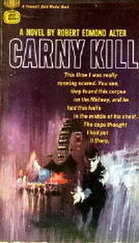Robert Alter - 101 Mystery Stories
Здесь есть возможность читать онлайн «Robert Alter - 101 Mystery Stories» весь текст электронной книги совершенно бесплатно (целиком полную версию без сокращений). В некоторых случаях можно слушать аудио, скачать через торрент в формате fb2 и присутствует краткое содержание. Город: New York, Год выпуска: 1986, ISBN: 1986, Издательство: Avenel Books, Жанр: Детектив, на английском языке. Описание произведения, (предисловие) а так же отзывы посетителей доступны на портале библиотеки ЛибКат.
- Название:101 Mystery Stories
- Автор:
- Издательство:Avenel Books
- Жанр:
- Год:1986
- Город:New York
- ISBN:978-0-517-60361-1
- Рейтинг книги:3 / 5. Голосов: 1
-
Избранное:Добавить в избранное
- Отзывы:
-
Ваша оценка:
- 60
- 1
- 2
- 3
- 4
- 5
101 Mystery Stories: краткое содержание, описание и аннотация
Предлагаем к чтению аннотацию, описание, краткое содержание или предисловие (зависит от того, что написал сам автор книги «101 Mystery Stories»). Если вы не нашли необходимую информацию о книге — напишите в комментариях, мы постараемся отыскать её.
101 Mystery Stories — читать онлайн бесплатно полную книгу (весь текст) целиком
Ниже представлен текст книги, разбитый по страницам. Система сохранения места последней прочитанной страницы, позволяет с удобством читать онлайн бесплатно книгу «101 Mystery Stories», без необходимости каждый раз заново искать на чём Вы остановились. Поставьте закладку, и сможете в любой момент перейти на страницу, на которой закончили чтение.
Интервал:
Закладка:
There were 23 of us taken prisoner that day, and of these one man — Tomas — had a bad wound in his side. We were crowded into a single large cell at the fortress and left to await our fate. It was hot in there, with the sweat of bodies and a mustiness of air that caught at my throat and threatened to choke me. I wanted to remove my black beret and shirt and stretch out on the hard stone floor, but I did not. Instead I bore it in silence and waited with the others.
A certain custom has existed in the country, a custom which has been observed in revolutions for hundreds of years. Always faced with the problem of the defeated foe, governments had traditionally sent down the order: Kill every fifth man and release the others. It was a system of justice tempered with a large degree of mercy, and acted as a deterrent while still allowing something of an opposition party to exist within the country. Of course the eighty percent who were released often regrouped to revolt again, but the threat that hung over them was sometimes enough to pacify their activities.
This, then, was the fate that awaited us — 23 prisoners in a gloomy fortress by the blue waters of a bay. We had reason to hope, because most of us had the odds on our side, but we had reckoned without the cold-blooded calculation of General Diam. The order came down early the following morning, and it was read to us through the bars of the cell. It was as we had expected: Every fifth man will he executed immediately. The remaining prisoners will be released in twenty-four hours.
But then came the jolting surprise. The officer in charge kept reading, and read the same message four times more. General Diam had sent down five identical executive orders. No one was to survive the executions.
I knew something had to be done, and quickly. As the guards unlocked the cell door I went to the officer in charge. Using my deepest voice I tried to reason with him. “You cannot execute all twenty-three of us. It would be contrary to orders.”
He looked down at me with something like scorn. “Be brave, little fellow. Die like a soldier!”
“But the first order says that every fifth man should be executed immediately. It means just that. They should be executed before you read the second order.”
The officer sighed. “What difference does it make? The day will be hot. Who wants to die under the noonday sun? At least now there is a bit of breeze out there.”
“You must obey the orders,” I insisted. “Each order must be executed separately.”
You can see, of course, the reason for my insistence. If the five executive orders were lumped together and carried out at once (as General Diam no doubt intended), all twenty-three of us would be shot. But if they were carried out separately, the orders would allow nine of us to live. I’d always been good at mathematics, and this was how I figured it — every fifth man would be taken from the original 23, a total of 4, leaving 19. The process would be repeated a second time, killing 3, leaving 16. On the third round another 3 would die, and 13 would be left. Then 2 shot, 11 left. A final 2 shot, and 9 of us would walk out of the fortress as free as the air.
You say the odds were still against me? Not at all — if the officer agreed to my argument, I was certain to survive. Because consider — how would the fifth man be picked each time? Not by drawing straws, for this was the military. We would line up in a single column and count off. And in what order would we line up — alphabetically? Hardly, when they did not even know our names. We would line up in the old military tradition — by height.
And I had already established during the night in the cell that I was the shortest of the 23 prisoners!
If they started the count-off at the short end of the line — which was unlikely — I would always be safe, for I would always be Number One. More likely, they would start at the tall end, and for the 5 count-offs I would always be last — numbers 23, 19, 16, 13, 11, and 9. Never a number divisible by 5 — never one of the doomed prisoners!
The officer stared down at me for what seemed an eternity. Finally he glanced through the orders in his hand once more and reached a decision. “All right, we will carry out the first order.”
We lined up in the courtyard — by height — with two men supporting the wounded Tomas, and started the count-off. Of the 23 of us, 4 were marched over to the sea wall and shot. The rest of us tried not to look.
Again — and 3 of our number died against the sea wall. One of the remaining 16 was starting to cry. He had figured out his position in the line.
The officer formally read the third executive order, and 3 more went to the wall. I was still last in the line.
After the fourth order 2 of the 13 were marched to their death. Even the firing squad was beginning to look hot and bored. The sun was almost above us. Well, only one more count-off and then 9 of us would be free.
“Wait!” the officer shouted, as the first man began to count off again. I turned my neck in horror. Tomas had fallen from the line and the blood was gushing from his side. He was dead, and the 11 was suddenly reduced to 10.
I was the tenth one as the last count began!
The fifth man stepped out of line — then six, seven, eight, nine, ten. I didn’t move.
“Come, little fellow,” the officer said. “It is your turn now.”
You ask how I come to be sitting here, when I was so surely doomed, when my careful figuring had gone for nothing. I stood there in that moment, looking death in the face, and did what I had kept from doing all night and morning. I knew the officer would obey General Diam’s order to the letter — to execute every fifth man — and that was what saved me.
I took the beret from my head, let my hair fall to my shoulders, and showed them I was a girl.
6
Vendetta
Guy de Maupassant
The widow of Paolo Saverini lived alone with her son in a poor little house on the outskirts of Bonifacio. The city, built on an out jutting part of the mountain, in places even overhanging the sea, looks across the foamy straits toward the southernmost coast of Sardinia. Around on the other side of the city is a kind of fjord which serves as a port, and which, after a winding journey, brings — as far as the first houses — the little Italian and Sardinian fishing smacks and, every two weeks, the old wheezy steamer which makes the trip to Ajaccio.
On the white mountain the clump of houses makes an even whiter spot. They look like the nests of wild birds, clinging to this peak, overlooking this terrible passage where vessels rarely venture. The wind, which bows uninterruptedly has swept bare the forbidding coast; it engulfs itself in the narrow straits and lays waste both sides. The pale streaks of foam, clinging to the black rocks, whose countless peaks rise up out of the water, look like bits of rag floating and drifting on the surface of the sea.
The house of Widow Saverini, clinging to the very edge of the precipice, looked out, through its three windows, over this wild and desolate picture. She lived there alone, with her son Antoine and their dog Semillante, a big thin beast, with a long rough coat, one of the kind of animals that is used for guarding the herds. The young man took her with him when out hunting.
One night, after some kind of quarrel, Antoine Saverini was treacherously stabbed by Nicolas Ravolati, who escaped the same evening to Sardinia.
When the old mother received the body of her son, which the neighbors had brought back to her, she did not cry, but stayed for a long time motionless, watching him; then, stretching her wrinkled hand over the dead body, she promised her son a vendetta.
Читать дальшеИнтервал:
Закладка:
Похожие книги на «101 Mystery Stories»
Представляем Вашему вниманию похожие книги на «101 Mystery Stories» списком для выбора. Мы отобрали схожую по названию и смыслу литературу в надежде предоставить читателям больше вариантов отыскать новые, интересные, ещё непрочитанные произведения.
Обсуждение, отзывы о книге «101 Mystery Stories» и просто собственные мнения читателей. Оставьте ваши комментарии, напишите, что Вы думаете о произведении, его смысле или главных героях. Укажите что конкретно понравилось, а что нет, и почему Вы так считаете.












